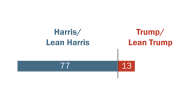by Carroll Doherty
The issue of immigration leaves many Americans deeply conflicted. But the social and economic cross-pressures may be greatest on African Americans, who express relatively positive opinions of immigrants even as they view them as competitors for scarce job opportunities.

The vast majority of African Americans believe Latin American immigrants are hard-working (79%) and have strong family values (77%). Nationally, blacks voice concern that the growing number of newcomers to the U.S. could threaten traditional American values, but those concerns are shared equally by whites. And on many issues – notably in opinions of whether illegal immigrants should be eligible for government-provided social services – African Americans are far more sympathetic to the plight of immigrants than are whites.
Twice as many blacks as whites say that illegal immigrants should be eligible for social services (by 43% vs. 20%). While two-thirds of whites (67%) think the children of illegal immigrants should be permitted to attend public schools, an even higher percentage of African Americans agree (79%).
However, more blacks than whites say they or a family member have lost a job, or not gotten a job, because an employer hired an immigrant worker (by 22% vs. 14%). Blacks are also more likely than whites to feel that immigrants take jobs away from American citizens (by 34%-25%), rather than take jobs that Americans don’t want.
For blacks, the growing presence of immigrant workers adds to the formidable obstacles they face in finding a job. More than three-quarters of blacks (78%) say jobs are difficult to find in their community, compared with only about half of Hispanics (55%) and whites (52%). In addition, 65% of African Americans say the availability of good jobs is a “very big problem” for the country; that compares with 43% of Hispanics and just 31% of whites.
Despite these concerns, however, blacks in the general public are more supportive than whites of permitting illegal immigrants to stay in the U.S. About half (47%) say they should be allowed to stay, while an identical percentage (47%) of blacks believe illegal immigrants should be required to leave the U.S. In contrast, whites by a 59%-33% margin say that illegals should be required to return home.
African Americans in Three Metro Areas
The divergent strains in black attitudes toward immigration are seen in surveys of three metropolitan areas that all have experienced rapid growth in immigration in recent years, but in very different ways – Raleigh-Durham, Chicago, and Washington, DC.
Raleigh-Durham, which had no established Latino community before 1990, saw its foreign-born population – composed overwhelmingly of Hispanics – nearly triple between 1990 and 2000, according to census data. Chicago and Washington, D.C. experienced a far greater influx of immigrants over this period, and are much larger metropolitan areas with large and established foreign-born populations. (For a detailed analysis of public opinion about immigration in these metro areas, as well as in Phoenix and Las Vegas, see Pew’s full report: America’s Immigration Quandary.)
In Chicago, where 80% of blacks say jobs are difficult to find, there is a widespread perception among African Americans that immigrant workers are damaging local job prospects. Fully 41% of African Americans say they or a family member have lost a job, or not gotten a job, because an employer hired an illegal immigrant instead. That is nearly double the number of blacks nationally who say this (22%), and almost triple the number of Chicago-area whites (15%) who say an immigrant worker has cost them or a family member a job.
Nearly half of Chicago-area African Americans (46%) favor decreasing the level of legal immigration into the U.S. This percentage is significantly greater than the fraction of blacks nationally expressing this opinion (34%). On most other immigration issues, however, blacks in Chicago have attitudes similar to those of blacks in the national public. For instance, fewer than half (45%) think that illegal immigrants should be required to return home, which mirrors the opinions of blacks nationally (47%), and is a bit lower than the percentage of Chicago-area whites (54%) who favor requiring all illegal immigrants to leave the country.
In comparison, African Americans in the Raleigh-Durham area are more supportive of restricting immigration – both legal and illegal – than are blacks nationally or those in Chicago or Washington D.C. A solid majority (57%) favors cutting back on legal immigration and 58% support requiring illegal immigrants to return home. And on an issue of local importance, a large majority of blacks in Raleigh-Durham (84%) believe that police should be required to check the immigration status of people they encounter during routine activities such as traffic stops; two-thirds of whites (67%) agree.
While Raleigh-Durham’s economy has been growing rapidly, most blacks feel the boom has bypassed them. Only about a quarter (28%) say there are plenty of jobs available in the community, compared with 58% of the area’s white population. Roughly three-in-ten blacks in Raleigh-Durham (29%) say they or a family member have lost a job to an immigrant worker.
Blacks in Raleigh-Durham are concerned about the cultural impact of immigration, as well as its economic consequences. Nearly six-in-ten (58%) say the growing number of newcomers in the U.S. threatens traditional customs and values, significantly more than the percentage of white Raleigh-Durham residents saying this (43%).

For the most part, black attitudes on immigration in the Washington, D.C are similar to those of African Americans nationally. However, as is true of blacks in Chicago and Raleigh-Durham, Washington-area African Americans voice considerable support for decreasing the level of legal immigration (48% do so, compared with 34% of blacks nationally).
Nonetheless, African Americans in the Washington area are notably more upbeat about local job prospects when compared with blacks elsewhere. About-four-in-ten (39%) say local job opportunities are plentiful, more than double the percentage of blacks nationally (18%). Even so, whites in the Washington D.C area are much more positive – 72% say there are plenty of jobs locally.




